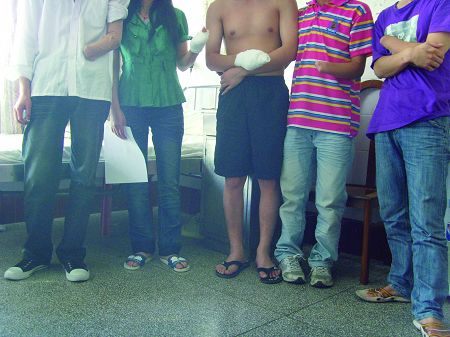One - handed justice
At midnight on June 10 last year, a scream broke the monotonous echo of dozens of pounding molding machines at the Elec-Tech factory in Zhuhai, Guangdong Province.
"My palm is crushed!" a voice screamed.
 |
|
Ruan Libing(second from right), with other injured Elec-Tech workers at the hospital in Zhuhai. |
It was Ruan Libin, a newly hired 21-year-old migrant worker from a village 800 kilometers away in Hunan Province. He had been working for a month but it was his fourth night shift and only the third time he had operated the 60-ton molding machine.
A great pain washed over Ruan. He felt dizzy for a moment, and then saw his blood all over the 3-meter tall machine that had suddenly crushed his left hand.
His colleagues, mostly in their early 20s, quickly surrounded him. Three minutes later, the head of a work unit arrived. He made a few phone calls, and helped Ruan walk to the factory gate. After another ten minutes, Ruan was finally helped into a factory-owned car. He sat in the car while his hand bled and hurt like hell. When he got to the hospital an hour later, Ruan almost lost consciousness.
But he remembered a scene that night in the hospital. He was put on an operating table, his eyes were covered with cloth. He heard the sound of sawing, it was quite rough as it sawed through something stubborn, and the room was filled with the smell of flesh and blood. That's the moment Ruan knew that he lost his left hand forever.
"When I was sent back to the recovery ward after the operation, I cried for so long that I didn't know when I fell asleep," said Ruan. Remembering it all 15 months later was tough for Ruan. He couldn't look at his left arm directly until recently and when he glances at it accidentally he looks quickly away.
'What if?'
Five months later, the social security department diagnosed Ruan's injury as a fifth-level deformity. (There are 10 levels, with one being the worst.) When experts examined his amputated limb, they sighed and said, "If only you hadn't lost your wrist, you wouldn't have lost the entire function of your hand."
Ruan couldn't help but think of the "what ifs."
What if the factory had dialed the health emergency number instead of waiting 20 minutes to transfer him to a factory-owned car.
What if the company sent him to the nearest hospital, instead of one an hour away on the opposite side of the city?
What most concerned Ruan was why the accident happened. He remembered that when he was hired, he'd been told that Elec-Tech supplies a wide range of home appliances to Wal-Mart.
During his first month, he was only ordered to do some legwork. On June 7, he started to operate the molding machine by himself after being instructed how to do it only once. The machine was one of many old pedal operated models at Elec-Tech.
"It isn't safe," Ruan said. "We had to push a peddle for it to work. The safety rule was to push the pedal once at a time, not repeatedly, or the machine would smash your hand. However, everyone kept repeatedly pushing the pedal in order to work faster to meet the quota."
While at the hospital, Ruan found that he was not alone. Seven other injured Elec-Tech workers were there, while others were sent elsewhere. Some had lost their fingers and some lost their toes.
"The machines eat hands!" said an anonymous colleague of Ruan, whose hand bones were crushed. He also told the Global Times that workers always worked overtime with little safety protection or instruction.
"The frontline management does not care about work safety. The more productivity we can achieve, the more bonuses they can earn," he said.
Later, Wal-Mart made two unannounced audits at Elec-Tech's Zhuhai plants and identified 55 incidents of staff injuries in the past 12 months, South China Morning Post and Bloomberg reported.
 0
0 






